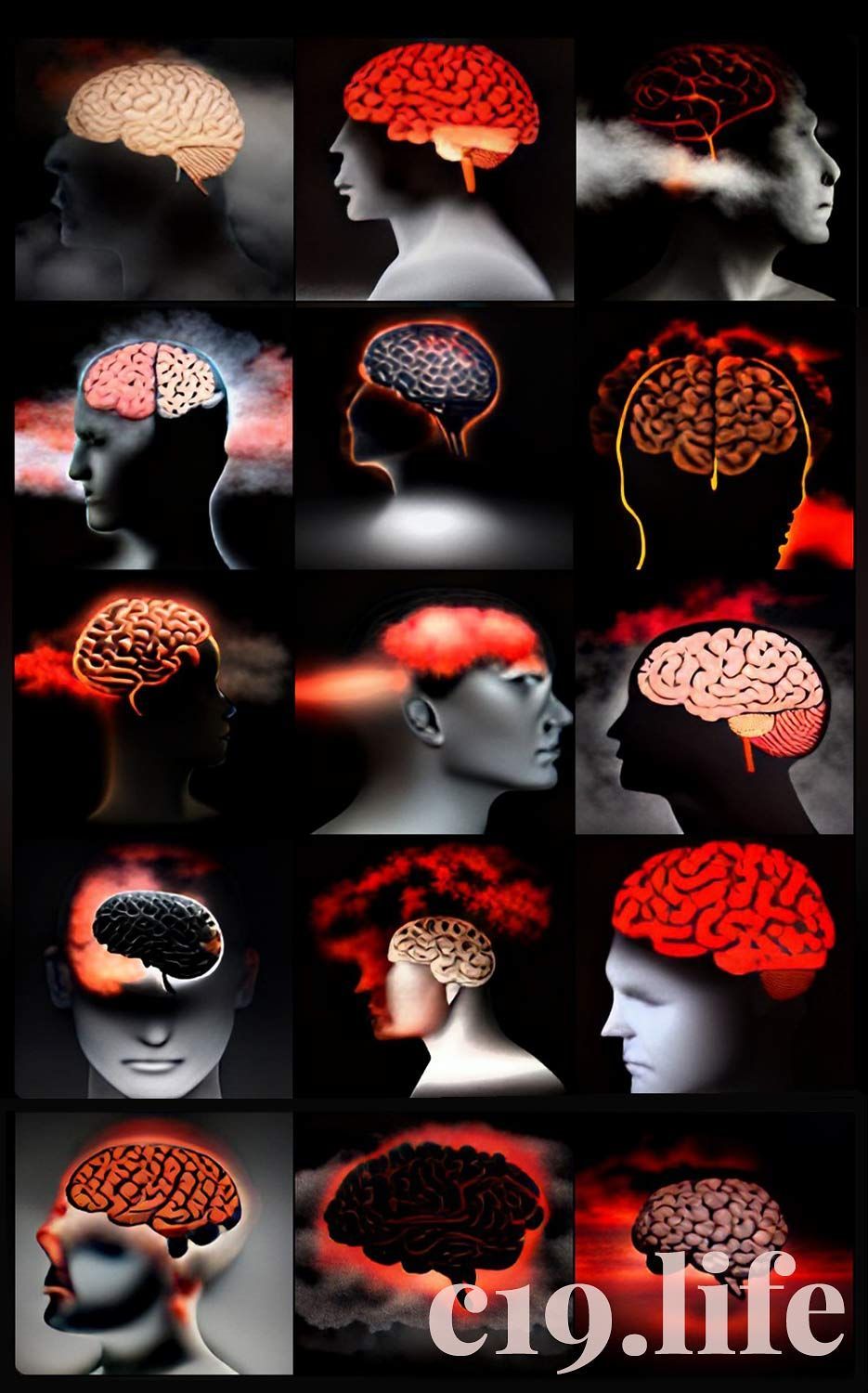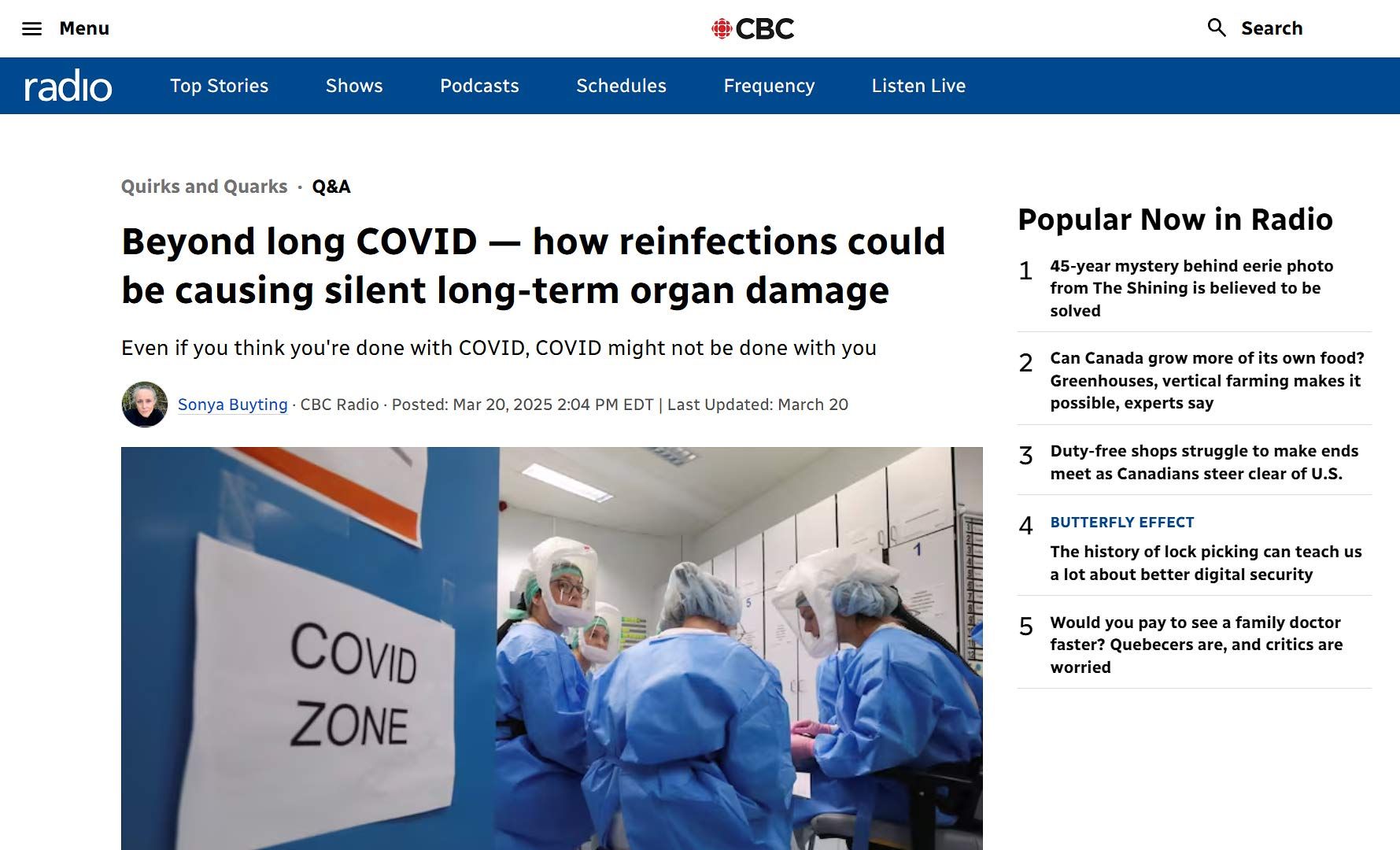on the brain
‘Those infected with the [SARS-CoV-2] virus are at increased risk of developing a range of neurological conditions in the first year after the infection. Such complications include strokes, cognitive and memory problems, depression, anxiety, and migraine headaches.’
WashU Medicine / Nature: Medicine (2022) ➤
❦ on the web of dementia
‘All subtypes of dementia, irrespective of patients’ previous dementia types, behaved like rapidly-progressive dementia following COVID-19.
Researchers also found that the characteristics of a particular type of dementia changed following COVID-19, and both degenerative and vascular dementias started behaving like mixed dementia both clinically and radiologically.
A rapidly and aggressively deteriorating course was observed in patients having insidious onset, slowly progressive dementia, and who were previously cognitively stable.’
IOS Press / Journal of Alzheimer’s Disease Reports (2023) ➤
❦ on neurodegenerative diseases
“The brains of people who died from COVID-19 were remarkably similar to the brains of people who die from neurodegenerative diseases such as Alzheimer’s and Parkinson’s, showing inflammation and disrupted circuitry.”
Tony Wyss-Coray, Professor of Neurology, Stanford University (2021)
❦ on acute and chronic neurological impacts
‘From mild anosmia [loss of smell] to severe ischemic stroke, the impact of SARS-CoV-2 on the central nervous system is still a great challenge to scientists and healthcare practitioners.
Besides the acute and severe neurological problems described, as encephalopathies, leptomeningitis, and stroke, the chronic impact observed during Long COVID or the post-acute sequelae of COVID-19 (PASC) greatly intrigues scientists worldwide.
Strikingly, even asymptomatic, and mild-diseased patients may evolve with important neurological and psychiatric symptoms such as confusion, memory loss, cognitive decline and chronic fatigue, associated or not with anxiety and depression.’
J.P.S Peron, Associate Professor of Neurology, University of Massachusetts (2023)
❦ on haemorrhages of the human foetal cortex
‘Strikingly, the [foetal brain] haemorrhages are predominantly found in the late first and early second trimester of gestation.
Specifically, the majority were between 12 and 14 PCW [post-conception week], a critical window of human foetal brain development when the endothelial tight junctions increase to form the blood-brain barrier.
Our observations of disrupted foetal cerebral vasculature are consistent with reports of damage to the microvasculature of the adult brain in SARS-CoV-2 infected patients.’
Massimo et al / Brain (2023)
❦ on children, mental health issues, and neurological problems
‘Children have largely been unaffected by severe COVID-19 [SARS-CoV-2 infection] compared to adults, but data suggest that they may have experienced new conditions after developing the disease.
We found significantly higher risks for some new conditions in exposed children, including mental health issues and neurological problems.
The overall excess risk for new-onset conditions after COVID-19 was 78% higher in the exposed than unexposed children.’
Di Chiara et al / Acta Paediatrica (2023)
❦ on catching a stroke in a café
“A bizarre recurring point of debate:
— “People die every day of lots of other things!”
True, but you don’t catch a stroke or cancer from other people in a restaurant.”
NHS Palliative Medicine Consultant (2023)
❦ fire and predisposition
“If someone is already predisposed to Parkinson’s, having COVID-19 could be like pouring more fuel on that ‘fire’ in the brain.
The same would apply for a predisposition for Alzheimer’s and other dementias that have been linked to inflammasomes.”
Trent Woodruff (NHMRC), Professor of Pharmacology, University of Queensland (2022)
❦ the brain & neurological system ~ further reading
C-19 Archives:
brain







































❦ the brain & neurological system: scientific papers & media articles
✒ 2024
📖 (19 Jan 2024 ~ Nature: Scientific Reports)
Microstructural brain abnormalities, fatigue, and cognitive dysfunction after mild COVID-19 ➤
❂
✒ 2023
📖 (7 Nov 2023 ~ Journal of Neurology) Persistent cognitive slowing in post-COVID patients: longitudinal study over 6 months ➤
❂
📖 (19 Sep 2023 ~ PNAS Nexus) Severe acute respiratory syndrome coronavirus 2 infection leads to Tau pathological signature in neurons ➤
❂
📖 (12 Sep 2023 ~ eBioMedicine: Lancet Discovery Science) Long-COVID cognitive impairments and reproductive hormone deficits in men may stem from GnRH neuronal death ➤
❂
📖 (1 Sep 2023 ~ Pre-print) SARS-CoV-2 Spike amyloid fibrils specifically and selectively accelerates amyloid fibril formation of human prion protein and the amyloid β peptide ➤
❂
📖 (8 June 2023 ~ Queensland Brain Institute) COVID-19 can cause brain cells to 'fuse' ➤
❂
📖 (7 June 2023 ~ Science Advances) SARS-CoV-2 infection and viral fusogens cause neuronal and glial fusion that compromises neuronal activity ➤
❂
📖 (1 May 2023 ~ Patient Care) Persistent Changes in Brain Function Observed in Persons with Long COVID ➤
➲ 'The greater activity occurred outside of the normal working memory brain network. We often see such changes in patients with a brain injury: deficits in the default mode network of the brain leads to an increase in activity in other regions to help maintain brain function.'
✢ Related: (26 Apr 2023 ~ Neurology) Changes in Brain Activation Pattern During Working Memory Tasks in People With Post-COVID Condition and Persistent Neuropsychiatric Symptoms ➤
➲ 'Post-Covid Condition (PCC) participants with neuropsychiatric symptoms demonstrated compensatory neural processes with greater usage of alternate brain regions, and reorganized networks, to maintain normal performance during working memory tasks.'
❂
📖 (19 Apr 2023 ~ Nature / Scientific Reports) Cognitive impairment in young adults with post COVID-19 syndrome ➤
➲ 'The results presented here reveal that at least 85% [of the 214 patients with post COVID-19 syndrome] exhibit deficits in one neuropsychological test.
Also, the youngest patients were those who showed the most marked and heterogeneous cognitive impairment, while the oldest patients maintained their cognitive functions preserved to a greater extent with only a mild impairment in attention and speed processing.'
❂
📖 (10 Apr 2023 ~ Nature / Scientific Reports) Cerebral hypoperfusion in post-COVID-19 cognitively impaired subjects revealed by arterial spin labeling MRI ➤
➲ 'The most frequent neurological manifestations of post-COVID-19 include increased fatigue, diffuse myalgia, ageusia, anosmia, headache, sleep disturbances, dysautonomia and cognitive impairment.
Particularly, cognitive impairment has been increasingly recognised as a long-term sequela of COVID-19.
Recent follow-up investigations reported prevalence of cognitive deficits in 36% of patients at 3 months and 10 months after infection.'
❂
📖 (4 Apr 2023 ~ SciTechDaily) Researchers Discover Connection Between Traumatic Brain Injury and Long COVID ➤
➲ 'The Linseman Laboratory is studying the long-term brain health effects of COVID-19 in individuals with and without traumatic brain injury (TBI).
Preliminary data suggest that those with a history of both COVID-19 and TBI experience more severe Long COVID symptoms, a higher symptom burden, and more frequent symptoms.
Those who reported having COVID-19 and TBI reported worse depressive symptoms, worse functional outcomes, and increased fatigue.'
❂
📖 (1 Apr 2023 ~ Human Genetics) Direct and indirect impact of SARS-CoV-2 on the brain ➤
➲ 'From mild anosmia to severe ischemic stroke, the impact of SARS-CoV-2 on the central nervous system is still a great challenge to scientists and healthcare practitioners.
Besides the acute and severe neurological problems described, as encephalopathies, leptomeningitis, and stroke, the chronic impact observed during Long COVID or the post-acute sequelae of COVID-19 (PASC) greatly intrigues scientists worldwide.
Strikingly, even asymptomatic, and mild-diseased patients may evolve with important neurological and psychiatric symptoms such as confusion, memory loss, cognitive decline and chronic fatigue, associated or not with anxiety and depression.'
❂
📖 (23 Mar 2023 ~ Brain Science) Parkinson's Disease, SARS-CoV-2, and Frailty: Is There a Vicious Cycle Related to Hypovitaminosis D? ➤
➲ 'The possible neurological consequences of SARS-CoV-2 infection, associated with physical and cognitive frailty, could lead to a worsening of Parkinson's disease (PD) in infected patients or – more rarely – to an increase in the Parkinsonian symptomatology.
Parkinson's disease (PD) or Parkinsonism has been described after infections with viruses, such as the Epstein-Barr virus, hepatitis C virus, HIV, influenza A virus, Japanese encephalitis virus, varicella zoster virus, or West Nile virus.
Therefore, the hypothesis that SARS-CoV-2 may have even longer-term effects on the brain and lead to an increase in cases of Parkinson's disease, as occurred in the years following the Spanish flu, has been put forward.'
❂
📖 (23 Mar 2023 ~ Frontiers in Neurology) Headache in long COVID as disabling condition: A clinical approach ➤
➲ 'The major late neurological manifestations [of Long COVID syndrome] include hyposmia, hypogeusia, dizziness, insomnia, and headache characterized by intense and frequent chronic pain that is resistant to easily accessible drugs.
Headache is a disabling condition in patients with Long COVID-19, exacerbating the conditions of those with headaches prior to contracting COVID-19.'
❂
📖 (March 2023 ~ European Neuropsychopharmacology) Brain correlates of subjective cognitive complaints in COVID-19 survivors: A multimodal magnetic resonance imaging study ➤
❂
📖 (March 2023 ~ Science Direct: Brain, Behavior, & Immunity) Neurocognitive and psychiatric symptoms following infection with COVID-19: Evidence from laboratory and population studies ➤
❂
📖 (6 Mar 2023 ~ Cells) Pathogenesis Underlying Neurological Manifestations of Long COVID Syndrome and Potential Therapeutics ➤
❂
📖 (1 Mar 2023 ~ Scientific American) Long COVID Now Looks like a Neurological Disease, Helping Doctors to Focus Treatments ➤
❂
📖 (1 Mar 2023 ~ Business Standard) Long Covid cuts brain oxygen, worsens cognitive problems, depression ➤
❂
📖 (1 Mar 2023 ~ University of Waterloo) Long COVID linked to lower brain oxygen levels, cognitive problems and psychiatric symptoms ➤
❂
📖 (March 2023 ~ Brain, Behavior, & Immunity: Health) Neurocognitive and psychiatric symptoms following infection with COVID-19: Evidence from laboratory and population studies ➤
❂
📖 (27 Feb 2023 ~ Lancet / eClinicalMedicine) Structural brain changes in patients with post-COVID fatigue: a prospective observational study ➤
❂
📖 (23 Feb 2023 ~ Journal of Neurology) Patterns of acute ischemic stroke and intracranial hemorrhage in patients with COVID-19 ➤
❂
📖 (20 Feb 2023 ~ Journal of Clinical Medicine) COVID-19-Related Neuropathic Pain: A Systematic Review and Meta-Analysis ➤
❂
📖 (14 Feb 2023 ~ Journal of Alzheimer's Disease Reports) The Effects of SARS-CoV-2 Infection on the Cognitive Functioning of Patients with Pre-Existing Dementia ➤
➲ 'Cognitive postscripts of COVID-19, codenamed as 'cognitive COVID' or 'brain fog,' characterized by multi-domain cognitive impairments, are now being reckoned as the most devastating sequelae of COVID-19.
The rapid progression of dementia, the addition of further impairments / deterioration of cognitive abilities, and the increase or new appearance of white matter lesion burden suggest that previously compromised brains have little defense to withstand a new insult (i.e., a 'second hit'-like infection / dysregulated immune response, and inflammation).'
✢ Related: (4 Apr 2023 ~ Eurekalert) New study shows SARS-CoV-2 infection accelerates the progression of dementia ➤
'All subtypes of dementia, irrespective of patients' previous dementia types, behaved like rapidly-progressive dementia following COVID-19.'
✢ Related: (4 Apr 2023 ~ NeuroscienceNews) COVID-19 Infection Accelerates the Progression of Dementia ➤
'A rapidly and aggressively deteriorating course was observed in patients having insidious-onset, slowly-progressive dementia, and who were previously cognitively stable.'
❂
📖 (13 Feb 2023 ~ NPJ Parkinson's Disease) Detection of SARS-CoV-2 viral proteins and genomic sequences in human brainstem nuclei ➤
❂
📖 (2 Feb 2023 ~ Brain) Neuropsychiatric disorders following SARS-CoV-2 infection ➤
❂
📖 (February 2023 ~ Leadership) Japan: Over 10% Of Kids With COVID-related Brain Disease Died In Japan – Survey ➤
❂
📖 (28 Jan 2023 ~ NeuroImage: Clinical) Brain diffusion alterations in patients with COVID-19 pathology and neurological manifestations ➤
❂
📖 (26 Jan 2023 ~ Plos Blogs: DNA Science) COVID Virus Ventures Beyond the Lungs, Often Lodging in the Brain ➤
❂
📖 (23 Jan 2023 ~ Journal of Neurology) Brain positron emission tomography (PET) and cognitive abnormalities one year after COVID-19 ➤
❂
📖 (19 Jan 2023 ~ Neuron) Virus exposure and neurodegenerative disease risk across national biobanks ➤
❂
📖 (18 Jan 2023 ~ Journal of Clinical Medicine) Cognitive Deficits in the Acute Phase of COVID-19: A Review and Meta-Analysis ➤
❂
📖 (17 Jan 2023 ~ BMC Neurology) Cortical Grey matter volume depletion links to neurological sequelae in post COVID-19 "long haulers" ➤
❂
📖 (16 Jan 2023 ~ Brain) Haemorrhage of human foetal cortex associated with SARS-CoV-2 infection ➤
➲ 'Strikingly, the [foetal brain] haemorrhages are predominately found in the late first and early second trimester of gestation, a period of development in which the effect of the COVID-19 pandemic has not been thoroughly investigated.
Specifically, the majority were between 12 and 14 pcw, a critical window of human foetal brain development when the endothelial tight junctions increase to form the blood-brain barrier.
Our observations of disrupted foetal cerebral vasculature are consistent with reports of damage to the microvasculature of the adult brain in SARS-CoV-2 infected patients.'
❂
📖 (14 Jan 2023 ~ Acta Neuropathologica Communications) Reduced T-cell densities in cranial nerves of patients who died with SARS-CoV-2 infection ➤
❂
✒ 2022
📖 (17 Dec 2022 ~ Acta Neuropathologica Communications) Brain autopsies of critically ill COVID-19 patients demonstrate heterogeneous profile of acute vascular injury, inflammation and age-linked chronic brain diseases ➤
❂
📖 (14 Dec 2022 ~ Nature) SARS-CoV-2 infection and persistence in the human body and brain at autopsy ➤
❂
📖 (12 Dec 2022 ~ Yale School of Medicine) Potential New Treatment for "Brain Fog" in Long COVID Patients ➤
❂
📖 (5 Dec 2022 ~ Nature Aging) Severe COVID-19 is associated with molecular signatures of aging in the human brain ➤
➲ 'COVID-19 is an acute respiratory disease often accompanied by neurological sequelae.
Individuals with previous severe COVID-19 exhibit a 10-year average drop in their global cognitive performance, mimicking accelerated aging.
Complementary studies combining neuroimaging and cognitive screening implicate COVID-19-induced impairment of the frontal cortex, a critical area for cognitive function.
Our findings indicate that COVID-19 is associated with molecular signatures of brain aging.'
❂
📖 (5 Dec 2022 ~ New Atlas) Harvard study links severe COVID with genetic signs of brain aging ➤
❂
📖 (30 Nov 2022 ~ Revue Neurologie) Cerebrospinal fluid biomarkers in SARS-CoV-2 patients with acute neurological syndromes ➤
❂
📖 (30 Nov 2022 ~ Psychiatry Research)
Two-year follow-up of brain structural changes in patients who recovered from COVID-19: A prospective study ➤
❂
📖 (10 Nov 2022 ~ Nature Medicine) Acute and postacute sequelae associated with SARS-CoV-2 reinfection ➤
❂
📖 (10 Nov 2022 ~ Journal of Neuropathology & Experimental Neurology) Neuropathological findings in COVID-19: an autopsy cohort ➤
❂
📖 (1 Nov 2022 ~ The University of Queensland, Australia) 'A silent killer' – COVID-19 shown to trigger inflammation in the brain ➤
➲ 'Research led by The University of Queensland has found COVID-19 activates the same inflammatory response in the brain as Parkinson's disease.
The discovery identified a potential future risk for neurodegenerative conditions in people who've had COVID-19, but also a possible treatment.
"It may explain why some people who've had COVID-19 are more vulnerable to developing neurological symptoms similar to Parkinson's disease."
The researchers found the spike protein of the virus was enough to start the process [of triggering the inflammasome pathway], and was further exacerbated when there were already proteins in the brain linked to Parkinson's.
"So if someone is already pre-disposed to Parkinson's, having COVID-19 could be like pouring more fuel on that 'fire' in the brain."
"The same would apply for a predisposition for Alzheimer's and other dementias that have been linked to inflammasomes."
❂
📖 (1 Nov 2022 ~ Nature Molecular Psychiatry) SARS-CoV-2 drives NLRP3 inflammasome activation in human microglia through spike protein ➤
❂
📖 (6 Oct 2022 ~ Neuron) The neurobiology of long COVID ➤
❂
📖 (28 Sep 2022 ~ The Tyee) The Coming COVID Brain Wreck? ➤
➲ 'A new study adds to concerns about the severity and scope of neurological damage the virus can cause.'
❂
📖 (27 Sep 2022 ~ Frontiers in Neuroscience) SARS-CoV-2, long COVID, prion disease and neurodegeneration ➤
❂
📖 (23 Sep 2022 ~ CTV News/Canada) COVID raises risk of long-term brain injury, large U.S. study finds ➤
❂
📖 (22 Sep 2022 ~ Nature Medicine) Long-term neurologic outcomes of COVID-19 ➤
➲ 'Our results show that in the postacute phase of COVID-19, there was increased risk of an array of incident neurologic sequelae including ischemic and hemorrhagic stroke, cognition and memory disorders, peripheral nervous system disorders, episodic disorders (for example, migraine and seizures), extrapyramidal and movement disorders, mental health disorders, musculoskeletal disorders, sensory disorders, Guillain-Barré syndrome, and encephalitis or encephalopathy.'
✢ Related: (22 Sep 2022 ~ Washington University School of Medicine in St. Louis) COVID-19 infections increase risk of long-term brain problems ➤
➲ 'Those who have been infected with the [SARS-CoV-2] virus are at increased risk of developing a range of neurological conditions in the first year after the infection.
Such complications include strokes, cognitive and memory problems, depression, anxiety and migraine headaches.
Additionally, the post-COVID brain is associated with movement disorders, from tremors and involuntary muscle contractions to epileptic seizures, hearing and vision abnormalities, and balance and coordination difficulties as well as other symptoms similar to what is experienced with Parkinson's disease.'
❂
📖 (11 Sep 2022 ~ BMC Translational Neurodegeneration) The COVID-19 pandemic and Alzheimer's disease: mutual risks and mechanisms ➤
❂
📖 (6 Sep 2022 ~ International Review of Neurobiology) Chapter Five - Smell deficits in COVID-19 and possible links with Parkinson's disease ➤
❂
📖 (Sep 2022 ~ Ageing Research Reviews) SARS-CoV-2 and the central nervous system: Emerging insights into hemorrhage-associated neurological consequences and therapeutic considerations ➤
❂
📖 (11 Aug 2022 ~ PNAS) Morphological, cellular, and molecular basis of brain infection in COVID-19 patients ➤
❂
📖 (29 Jul 2022 ~ Brain) Neurovascular injury with complement activation and inflammation in COVID-19 ➤
❂
📖 (29 Jul 2022 ~ Brain: Editorial) How COVID-19 affects microvessels in the brain ➤
❂
📖 (7 Jul 2022 ~ Nature) COVID and the brain: researchers zero in on how damage occurs ➤
❂
📖 (July 2022 ~ Brain) Neurovascular injury with complement activation and inflammation in COVID-19 ➤
❂
📖 (30 Jun 2022 ~ News Medical Life Sciences) Ischemic stroke risk may be higher after COVID-19 compared to flu or bacterial pneumonia ➤
❂
📖 (May 2022 ~ Brain) Persistent white matter changes in recovered COVID-19 patients at the 1-year follow-up ➤
❂
📖 (22 Apr 2022 ~ Frontiers in Neuroscience) Brain Imaging Changes in Patients Recovered From COVID-19: A Narrative Review ➤
❂
📖 (1 Apr 2022 ~ Nature) Neuropathology and virus in brain of SARS-CoV-2 infected non-human primates ➤
❂
📖 (7 Mar 2022 ~ Nature) SARS-CoV-2 is associated with changes in brain structure in UK Biobank ➤
❂
📖 (22 Feb 2022 ~ Parkinson's Foundation) The Flu Factor: Is There a Link to Parkinson's? ➤
➲ 'It has long been suspected by scientists that the flu (influenza) might play a role in developing Parkinson's disease (PD) later in life.
Compared to those who were not diagnosed with the flu, there was a 90% higher risk of PD for those who had the flu 15 or more years earlier.
Inflammation is clearly a factor in PD – and influenza is known to trigger an extreme inflammatory response in the body.
In light of the COVID-19 pandemic, and its known neurological consequences such as brain fog and loss of smell, continued robust research into how inflammation impacts the brain is warranted.'
❂
📖 (12 Jan 2022 ~ UConn Today) COVID is Not Just a Respiratory Illness – It Can Cause Strokes Too ➤
❂
✒ 2021
📖 (1 Dec 2021 ~ JAMA Neurology) Long-term Risk of Parkinson Disease Following Influenza and Other Infections ➤
➲ 'Influenza has been associated with the risk of developing Parkinson disease, but the association is controversial.
In this case-control study, influenza was associated with diagnoses of Parkinson disease more than 10 years after infection.'
❂
📖 (30 Sep 2021 ~ Translational Psychiatry) Neuropsychiatric manifestations of COVID-19, potential neurotropic mechanisms, and therapeutic interventions ➤
❂
📖 (22 Jun 2021 ~ Medical Xpress) Autopsy study shows how COVID harms the brain ➤
❂
📖 (21 Jun 2021 ~ Nature) Dysregulation of brain and choroid plexus cell types in severe COVID-19 ➤
❂
📖 (June 2021 ~ Brain Hemorrhages) COVID-19 and stroke: A review ➤
➲ 'COVID-19 patients have presented with a wide range of neurological disorders, among which stroke is the most devastating.
SARS-CoV-2 infection induces coagulopathy, disrupts endothelial function, and promotes hypercoagulative state. Severe COVID-19 infection renders patients bedridden, and in certain cases requiring instrumental support.'
❂
📖 (8 Apr 2021 ~ St. Luke's Health) Connections Between COVID-19 and Stroke You Need to Know ➤
❂
📖 (23 Mar 2021 ~ Annals of Clinical and Translational Neurology) Persistent neurologic symptoms and cognitive dysfunction in non-hospitalized Covid-19 "long haulers" ➤
❂
📖 (1 Mar 2021 ~ Hospital Practice) SARS-CoV-2 invasion of the central nervous: a brief review ➤
❂
📖 (15 Jan 2021 ~ European Journal of Nuclear Medicine) The cerebral network of COVID-19-related encephalopathy: a longitudinal voxel-based 18F-FDG-PET study ➤
❂
📖 (07 Jan 2021 ~ Reproductive Sciences) Testicular Atrophy and Hypothalamic Pathology in COVID-19: Possibility of the Incidence of Male Infertility and HPG Axis Abnormalities ➤
❂
✒ 2020
📖 (10 Sep 2020 ~ BMC / Fluids and Barriers of the CNS) The potential role of microvascular pathology in the neurological manifestations of coronavirus infection ➤
❂
📖 (20 Aug 2020 ~ NPJ Parkinson's Disease) COVID-19 and possible links with Parkinson's disease and parkinsonism: from bench to bedside ➤
❂
📖 (13 Mar 2020 ~ ACS Chemical Neuroscience) Evidence of the COVID-19 Virus Targeting the CNS: Tissue Distribution, Host-Virus Interaction, and Proposed Neurotropic Mechanisms ➤
❂



